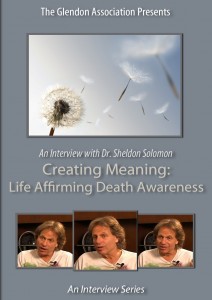Dr. Sheldon Solomon on Sexuality and Death Awareness: Exclusive Interview
The following transcript contains part of an exclusive interview with Dr. Lisa Firestone and Dr. Sheldon Solomon.
Sheldon Solomon talks about sexuality and death awareness.
LF You know, you’ve written some, too, about how our feelings about death affect how we feel about our bodies and really, you know, sort of the problem with sex and how that makes that a reality. And I wonder if you could talk a little bit about that.
SS Actually, I wish we had Jamie Goldenberg here because she would be much more eloquent and articulate on this score. You know Jamie goes way back. She was,we met her when she was a graduate student. We were just young punks and what I like about Jamie – well, I like a whole lot of things about her. But her really keen sense of herself and it was Jamie who, when I first met her, she was like, “Death – unacceptable.” And I’m like, “Yes, I share that view.” But what she resonated more than anything to was the idea that Becker calls us ‘god’s with anuses.’ You know, on the one hand we’re these cerebral ethereal creatures that defecate and die. And she became very interested in another little Becker phrase where he just said, “Sex and death are twins.” And his point, very simply, was that sexuality in the raw physical sense of the word is the ultimate de-individuating insult because in – it’s a hormonally driven enterprise that renders you a temporary piece of meat in an ongoing biological process for which you are literally just a gene machine. So Becker’s point is that there’s a sense in which the very act of sex reminds one of mortality.
And, now, we also know however that’s got to only of necessity be only half of the story. Right, because sex is good, not only feels good we also realize that it’s the ultimate expression of our affection for another human being. So we knew that there had to be more going on and indeed, what our studies have tended to show is that when people are reminded of their mortality they find just the physical aspects of sex less appealing. And when people are reminded of sex as just a physical act so when you compare humans having sex to, like, elephants copulating in the zoo, that that makes unconscious death thoughts come more readily to mind. So empirically, you know, we’ve shown that that relationship cuts both ways. That reminding people of death makes certain sexual behaviors less appealing and reminding people of sex as just a crass physical biologically, hormonally driven reproductive act, that makes death come more readily to mind.
Alright, but that doesn’t help us understand the other side of it. And Becker’s view and Jamie and we have, in collaboration with her shown this to be true empirically is that, but that’s not the only aspect to sexuality. It is more than just a physical intersection between pulsating piles of biological protoplasm. And in fact, every culture has ways –well not every culture because there are some that despise sexuality and it’s amazing that they’re still around because I don’t see how there’d be people. But for the most part, every culture has socially sanctioned forms of sexual behavior that render sex palatable and appropriate. And when we remind people of death and frame sex in that way, no, then it becomes more attractive. And so it kind of cuts both ways. In our world sex is most appealing psychologically speaking when it has romantic connotations. But as you know, that’s a relatively new idea and a particularly, frankly, Western one some would argue. Now I don’t speak with authority here because I can’t see how that would be true with the like Kama Sutra and all of the Asians where they’ve got the manuals that make me blush even. But, I don’t think that undermines the point, though, which is that sex unadorned by love or a cultural understanding of appropriate sexual behavior, yes, is psychologically discombobulating and conjures up images of our mortality. But when given a veneer – and I don’t mean that negatively in any way – of, when it’s attached to love and when it’s associated with sets of culturally accepted customs, then it’s fine.
The problem with that as you know, is that human beings are, you know, to use Freud’s lovely term, polymorphously perverse, which he did not mean pejoratively. You know, Freud’s conception of sex is much broader than most of us would understand. He just saw it as a pleasurable interface between a body and its surroundings. So Freud, if I understand him correctly, what he called sex, we would call sensuality. You know, because his thing is yes, sex is sexual. Eating a ripe strawberry and going “Oh, man, that was fucking delicious.” That is also, in his way of thinking about things is a sensual/sexual experience. The joke I always make with the Skidmore students, I’m always like, “Who’s got your favorite shirt? Like, do you have like your favorite shirt, like that feels good. Like you’re having an auto-erotic experience with a textile.” But the point is and I guess the point I’m trying to make is that the problem with culturally constructed standards of appropriate sexual activity is that they are always substantially more narrow than what people would do left to their own personal predilections.
And as you know, sexuality, you know, we tend to think of, you’re homosexual or you’re heterosexual. You know, that’s a ridiculous effort to dichotomize what ought to be seen as different grades along a continuum that varies in any number of dimensions. So my problem is, I get it, we need to restrict the range of what we declare to be “normal.” This is an Otto Rank point or sex would be unbearable. So Rank anticipated that the days of free love would cause more problems than they would solve. That they would actually make us more anxious. And I think there’s ample evidence just in Viagra sales that there’s some truth to that notion. But I also especially from having connections to some of the transgender folks and just seeing how difficult it is when you’re quite natural by the way sexual inclinations are disparaged by the cultural main stream. That’s not good. And so this gets us back to the rock and the hard place notion is how do we accept that sex and death are intrinsically connected and therefore prone to be problematic without artificially restraining what we declare to be appropriate and not, in so doing, literally devastate a fairly large chunk of humanity these days. Yes, that’s my view of that.
Order a DVD of Dr. Sheldon Solomon’s full interview with PsychAlive, “Creating Meaning“
 In this DVD, Dr. Sheldon Solomon addresses a variety of topics concerning how human beings can create meaningful lives in the face of death. In a lively and candid style, Dr. Solomon discusses the development of Terror Management Theory, the ways in which people form defenses against death anxiety and the concept of life affirming death awareness, arguing that we can “accept the reality of the human condition and parlay that into bringing out the best in us. ” He also addresses the societal effects of death awareness, including the social nature of human beings, the role of education and government, and the elements that make up an ideal society. Ultimately, Dr. Solomon advocates that people treat one another humanely and with a greater emphasis on compassion.
In this DVD, Dr. Sheldon Solomon addresses a variety of topics concerning how human beings can create meaningful lives in the face of death. In a lively and candid style, Dr. Solomon discusses the development of Terror Management Theory, the ways in which people form defenses against death anxiety and the concept of life affirming death awareness, arguing that we can “accept the reality of the human condition and parlay that into bringing out the best in us. ” He also addresses the societal effects of death awareness, including the social nature of human beings, the role of education and government, and the elements that make up an ideal society. Ultimately, Dr. Solomon advocates that people treat one another humanely and with a greater emphasis on compassion.
Read More from Dr. Sheldon Solomon
 Dr. Sheldon Solomon is a psychologist and the Ross Professor for Interdisciplinary Studies at Skidmore College. He is best known for developing Terror Management Theory, along with Jeff Greenberg and Tom Pyszczynski, which is concerned with how humans deal with their own sense of mortality. Dr. Solomon is the author or co-author of more than 100 articles and several books, including In the Wake of 9-11: The Psychology of Terror. He’s been featured in several films and TV documentaries as well as countless radio interviews.
Dr. Sheldon Solomon is a psychologist and the Ross Professor for Interdisciplinary Studies at Skidmore College. He is best known for developing Terror Management Theory, along with Jeff Greenberg and Tom Pyszczynski, which is concerned with how humans deal with their own sense of mortality. Dr. Solomon is the author or co-author of more than 100 articles and several books, including In the Wake of 9-11: The Psychology of Terror. He’s been featured in several films and TV documentaries as well as countless radio interviews.









Leave a Reply
You must be logged in to post a comment.